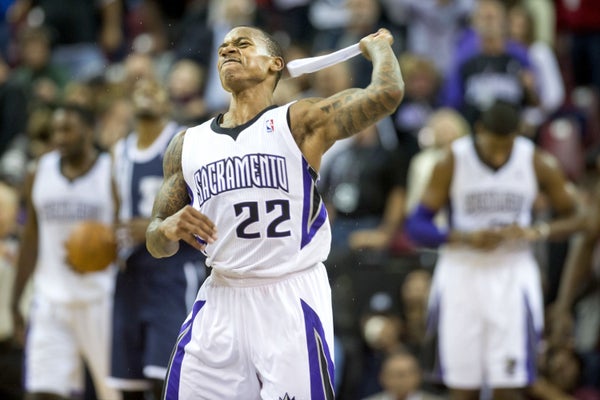September 16, 2024
2 min read
The Brain Really Does Choke Under Pressure
Study links choking under pressure to the brain region that controls movement

Basketball star Isaiah Thomas reacts after missing a crucial shot.
Hector Amezcua/Sacramento Bee/Tribune News Service via Getty Images
Have you ever been in a high-stakes situation in which you needed to perform but completely bombed? You’re not alone. Experiments in monkeys reveal that ‘choking’ under pressure is linked to a drop in activity in the neurons that prepare for movement.
“You see it across the board, you see it in sports, in all kinds of different sports and outside of sports as well.” says Steven Chase, a neuroscientist at Carnegie Mellon University in Pittsburgh, Pennsylvania. Chase and his colleagues investigated what happens in the brain that causes performance to plummet, and published their findings in Neuron on 12 September.
Choking under pressure is not unique to humans. In the same way that a tennis player might miss a match-winning shot, monkeys can also underperform in high-reward situations.
On supporting science journalism
If you’re enjoying this article, consider supporting our award-winning journalism by subscribing. By purchasing a subscription you are helping to ensure the future of impactful stories about the discoveries and ideas shaping our world today.
Winning jackpot
The team set up a computer task in which rhesus monkeys received a reward after quickly and accurately moving a cursor over a target. Each trial gave the monkeys cues as to whether the reward would be small, medium-sized, large or ‘jackpot’. Jackpot rewards were rare and unusually big, creating a high-stakes, high-reward situation.
Using a tiny, electrode-covered chip implanted into the monkeys’ brains, the team watched how neuronal activity changed between reward scenarios. The chip was situated on the motor cortex, an area of the frontal lobe that controls movement.
The researchers found that, in jackpot scenarios, the activity of neurons associated with motor preparation decreased. Motor preparation is the brain’s way of making calculations about how to complete a movement — similar to lining up an arrow on a target before unleashing it. The drop in motor preparation meant that the monkey’s brains were underprepared, and so they underperformed.
The results “help us understand how reward-outcome-mediated behaviour is not linear”, says Bita Moghaddam, a behavioural neuroscientist at Oregon Health & Science University in Portland.
To a certain extent, “you just don’t perform better as the reward increases”, Moghaddam says. It would also be interesting to see how other brain regions respond in jackpot-reward situations, she adds, because multiple regions could be involved.
Peak preparedness
The researchers then investigated why motor preparation decreases in high-stakes scenarios. An analysis of how the motivation of rewards and neural preparation was related to monkeys’ performance suggested that, as the size of a reward increases, neural activity reaches a point of peak preparedness. For even larger rewards, preparedness begins to wane, pushing the brain out of its sweet spot for performance. The researchers call this the neural-bias hypothesis.
The team is also interested in whether choking under pressure can be avoided, Chase says. For example, he wonders whether getting feedback on one’s brain activity could help to optimize performance. But first, the team will need to study the phenomenon more in humans, he says.
This article is reproduced with permission and was first published on September 12, 2024.

